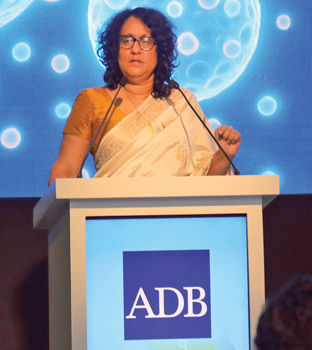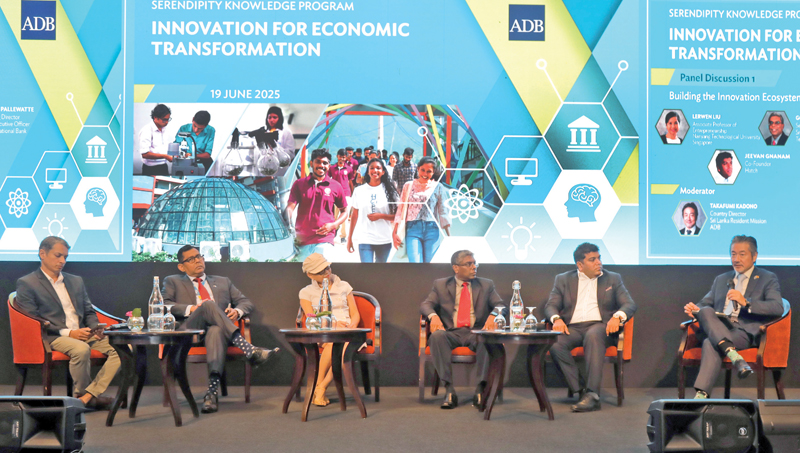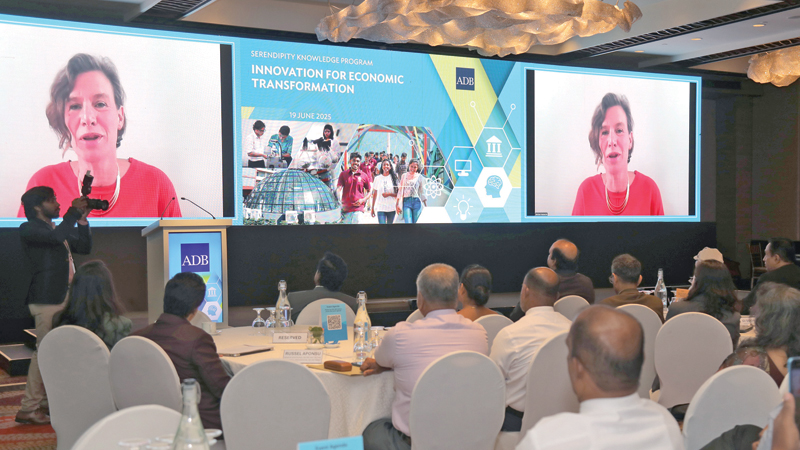The world is changing rapidly, with digital acceleration, climate volatility, demographic shifts, and economic uncertainties reshaping every aspect of life. In this setting, innovation has become more than just a concept; it has become a reality. It is now a vital engine for inclusive and sustainable development.
In Sri Lanka, however, the general perception is that the country continues to lack the appropriate framework to fully nurture innovation, particularly in converting new ideas into measurable economic impact. Although the current government has started breaking down institutional barriers and promoting innovative thinking, these steps represent only the initial stage of what must be a comprehensive transformation.
Against this backdrop, the 13th edition of ADB’s Serendipity Knowledge Program was held in Colombo recently focused on a key theme for Sri Lanka’s future: Innovation for Economic Transformation.
The program brought together thought leaders, policymakers, academics, and industry experts from Sri Lanka and across Asia to explore how innovation can be integrated into governance, finance, technology, and skills development to bring about real and lasting change.
ADB Country Director for Sri Lanka Takafumi Kadono said that Sri Lanka is at a transformative moment in its history underpinned by economic and political shifts in response to the economic crisis and a compelling ask by the people for changes to economic dispensation and governance.” He said that the government has undertaken comprehensive reforms across the economy to address these expectations and establish a new resilient economic pathway.
University development and research capacity
Kadono reiterated ADB’s support for educational infrastructure development. ADB has supported the establishment of three technology faculties, an engineering faculty, and a medical faculty across five universities in Sri Lanka, with one facility having opened just a few weeks ago
The ADB Country Director emphasised that the innovations taking place in these faculties demonstrate “the capacities within universities to contribute to the economy and society through research and development.”
Kadono provided a comprehensive definition of innovation’s role in economic development. He stated that “innovation is a major factor that contributes to economic transformation through productivity gains and shifting resources to produce more complex goods in productive sectors and deliver high-quality services.”
He further explained that high-value production and services facilitate access to global and regional value chains, diverse markets, job creation, and improved living standards. For developing countries like Sri Lanka, he emphasised that “building national innovation systems to support purposeful innovation is a key factor in transforming their economies.”
The Country Director expressed appreciation for the Prime Minister’s participation. “The government’s presence at the event was a strong indication of the importance the government places on fostering innovation to transform the economy and take Sri Lanka on a new stronger economic trajectory.”
Kadono expressed hope that the discussions would “strengthen our longer-term collaboration between ADB and the government and all the other stakeholders to explore and take bold initiatives to identify and undertake critical missions for the country’s urgent economic transformations.”
Prime Minister Dr. Harini Amarasuriya in her outlined the government’s ambitious plan to steer Sri Lanka towards a new economic path. The Government, she said, wouldn’t just watch from the sidelines but would actively participate in creating public value—a concept long championed by economists like Prof. Mariana Mazzucato, the keynote speaker at the event.

Prime Minister Dr. Harini Amarasuriya
What she emphasised was that innovation is not a luxury, but the catalyst for meaningful transformation. “It is about reimagining how we live, work, and govern. We must cultivate a culture of innovation that is ethical, inclusive, and sustainable, one that improves lives, reduces inequality, and drives inclusive growth innovation must also align with climate resilience and sustainable development through green technologies, renewable energy, and the circular economy,” she said.
She highlighted that Despite heavy investment in general education, the country has created a deeply unequal educational landscape “where there are a few schools of high quality and many schools that offer a low-quality teaching/learning experience.’ This inequality has created a system that’s become obsessed with competition and exam results rather than actual learning. Students spend their time cramming for tests instead of developing critical thinking skills.
As Dr.Amarasurriya pointed out, this approach has damaged the quality of higher education and research across the country.
Challenging old assumptions
The Prime Minister elaborated on some widely held beliefs about education that she said were completely wrong. For years, people have complained that Sri Lanka produces too many Arts and Humanities graduates, that graduates can’t find jobs because they lack soft skills, and that education is essentially a private investment that only benefits individuals.
Dr. Amarasuriya said the real problem is that the school system itself creates artificial divisions between science and humanities subjects. Many schools don’t even offer science and maths at advanced levels, forcing students into arts subjects not by choice but by circumstance.
Lessons from other counties
Dr. Amarasuriya highlighted how other nations have successfully connected their universities to innovation. The UK started Knowledge Transfer Partnerships back in 1975, connecting businesses with academic researchers to turn ideas into real-world solutions. Australia repositioned its universities in the 1980s as key players in national innovation, encouraging them to work with industry and commercialise their research.
Even more impressive is what’s happening at the Indian Institute of Technology (IIT ) Madras in India. The Prime Minister outlined their plan to launch over 100 startups every year, with the potential for a new company to go public every month. The university holds small equity stakes in these startups, showing how committed they are to nurturing innovation.
Universities as Innovation Centres
Dr. Amarasuriya is passionate about the role universities should play in Sri Lanka’s transformation. “Universities must be at the heart of our innovation ecosystem; they must serve as hubs of creativity, collaboration, and entrepreneurship driving forward the ideas and solutions that will shape our future,” she highlighted.
She outlined three key areas where universities need to step up. First, they need to encourage real collaboration between different academic disciplines. Dr. Amarasuriya was particularly critical of the tendency to treat arts and humanities as just add-ons to science and engineering projects. True collaboration, she said, means all disciplines working together as equals.
Second, she said, universities need to connect with industries and communities, especially marginalised groups like low-income families, women, and people with disabilities. Through internships, student projects, and guest lectures, universities can identify real problems and develop practical solutions.
Third, despite the brain drain that’s been hurting Sri Lanka, the Prime Minister believes the country can turn this into an advantage. By maintaining strong connections with Sri Lankan researchers and business leaders living abroad, the country can tap into global knowledge networks and expertise.
Dr. Amarasuriya emphasised that innovation shouldn’t just be about making money or getting patents. While those things matter, the real goal should be reducing inequality, tackling climate change, and finding sustainable solutions to the country’s problems. Innovation needs to be driven by ethical leadership and genuine public engagement.
The Prime Minister said that the government is committed to supporting innovation through practical policies and smart investments. But she was clear that the government won’t be doing this alone, young people and the private sector need to take the lead.
Adding weight to the Prime Minister’s call for transformation, Professor in Economics of Innovation and Public Value and Founding Director of Institute for Innovation and Public Purpose, University College London, Mariana Mazzucato delivered her keynote address that provided a practical framework for achieving these ambitious goals. The renowned economist, who has advised governments worldwide, emphasised that real change requires abandoning the old playbook entirely. Prof/ Mazzucato provided a blueprint for how this transformation could happen through mission-oriented policies and stronger state capabilities.
“We don’t get growth and transformation by worrying about transformation,” Mazzucato said. “We get it precisely by catalyzing all those different innovations bottom-up innovations in the public sector, the private sector and civil society organisations.”

From Left: Heminda Jayaweera (Executive Director TRACE / Cofounder 3H), Damith Pallewatte (Managing Director/Chief Executive Officer, Hatton National Bank), Lerwen Liu (Associate Professor of Entrepreneurship, Nanyang Technological University, Singapore), Gomika Udugamasooriya (Senior Advisor to the President of Sri Lanka on Science and Technology), Jeevan Gnanam (Co-founder, Hatch), and Takafumi Kadono (Country Director for Sri Lanka, ADB), engaged in a panel discussion regarding building the Innovation Eco-system during the Serendipity Knowledge Program, Innovation for Economic Transformation.
Prof. Mazzucato thus challenged the traditional economic thinking that dominates policy discussions. Instead of simply fixing what economists call “market failures,” she argued for a more ambitious approach – ie actively shaping markets to deliver the kind of growth countries want. Asian nations such as Sri Lanka must adopt mission-oriented innovation policies as a bold new approach to economic transformation, she emphasised.
She also said that public banks must transform from mere financiers into strategic, outcome-oriented partners to drive the “mission-oriented” innovation needed for economic transformation.
Drawing inspiration from the Apollo moon landing, she reminded the audience that President John F. Kennedy didn’t say America was going to the moon “because it’s easy.” Quite the opposite: “We’re doing it because it’s hard not because it’s easy.”
A mindset shift is crucial, according to Mazzucato. Getting to the moon wasn’t just about aerospace technology. It involved solving countless problems along the way, from developing new materials for spacesuits to figuring out how astronauts would eat and even use the bathroom in space.
One of Mazzucato’s key visions is that countries need to think in terms of missions rather than sectors. Climate change, for example, isn’t just about renewable energy or artificial intelligence—it requires all sectors to work together towards a common goal.
She illustrated this with her work advising the Prime Minister of Barbados, helping develop a mission to transform the island nation into “one of the cleanest and most beautiful large ocean states” with 100 percent sustainable domestic activities by 2035. This mission approach meant rethinking tourism not as the priority sector, but as one of many sectors that needed transformation to achieve the broader goal.
The power of procurement
Prof. Mazzucato highlighted an often-overlooked tool for driving innovation: government procurement. She pointed to NASA’s procurement chief Ernest Brackett, who transformed how the space agency bought goods and services. Instead of simply focusing on cost, he shifted to “challenge-oriented procurement with incentives for innovation and quality improvement.”
This same approach, she argued, could transform everything from school meals to infrastructure projects. In her work with various governments, she helped turn school meal programs into what she called “moonshots”—making them “healthy, tasty, and sustainable” while supporting local food production and creating more diverse supply chains.
Building State capacity
A recurring theme in Mazzucato’s presentation was the critical importance of building strong capabilities within government institutions. She warned against the trend of excessive outsourcing and what she termed the “consultification” of government.
Quoting Ernest Brackett again, she emphasised: “We need more capabilities inside NASA, not brochuremanship.” The NASA procurement Chief had warned that too much outsourcing would leave government officials unable to effectively partner with the private sector—they wouldn’t even know how to write proper terms of reference or avoid being captured by private interests.
Prof. Mazzucato stressed that successful innovation requires a new kind of partnership between the public and private sectors. This means moving away from the current model where risks are socialised (borne by taxpayers) while rewards are privatised (captured by companies).
Instead, she advocated for “sharing risks, sharing rewards, and welcoming uncertainty.” This approach recognizes that in any portfolio of innovative projects, some will succeed and others will fail—but the key is ensuring that when successes occur, the benefits are shared more equitably.
Prof. Mazzucato challenged how we measure success. Even if the Apollo mission had failed just before reaching the moon, it would still have been tremendously valuable because of all the innovations it generated along the way—from camera phones to baby formula to software solutions, she argued.
Current evaluation methods like cost-benefit analysis and net present value don’t capture these “dynamic spillovers,” she said. This suggests that countries need better ways to measure the true impact of mission-oriented innovation efforts.
Major challenges
During the panel discussion, Jeevan Gnanam, Co-Founder of Hatch, identified three major challenges facing Sri Lanka’s R&D commercialisation ecosystem. First is severe underfunding – while the country should invest 5 percent of its GDP in startups, Sri Lanka only invested $1 million last year (0.014 percent of GDP). Second is limited market access, as Sri Lanka is constrained by its 22 million population, though he sees an opportunity in positioning the country as an innovation hub for South Asia’s nearly 2 billion people across Bangladesh, India, and Pakistan.
Third is brain drain, particularly during the financial crisis, where talented individuals leave the country. His organisation Hatch is addressing these through creating funds in Singapore and Sri Lanka, promoting corporate innovation partnerships, and lobbying for government policy changes like reduced tender requirements to support local startups.
(To be continued on next week)






